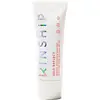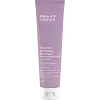What's inside
What's inside
 Key Ingredients
Key Ingredients

 Benefits
Benefits

 Concerns
Concerns

 Ingredients Side-by-side
Ingredients Side-by-side

Zinc Oxide
Cosmetic ColorantCaprylic/Capric Triglyceride
MaskingCoconut Alkanes
EmollientCetearyl Alcohol
EmollientGlycerin
HumectantAloe Barbadensis Leaf Juice
Skin ConditioningPyrus Malus Fruit Extract
Skin ConditioningCoco-Glucoside
CleansingLactobacillus Ferment
Skin ConditioningRubus Idaeus Seed Oil
EmollientCocos Nucifera Oil
MaskingCurcuma Longa Rhizome Oil
Skin ConditioningButyrospermum Parkii Nut Extract
EmollientHydrolyzed Jojoba Esters
Skin ConditioningTocopherol
AntioxidantDipotassium Glycyrrhizate
HumectantVanilla Planifolia Fruit Extract
Skin ConditioningGlycyrrhiza Glabra Root Extract
BleachingButylene Glycol
HumectantIsostearic Acid
CleansingLecithin
EmollientPolyglyceryl-3 Polyricinoleate
EmulsifyingPolyhydroxystearic Acid
EmulsifyingCoco-Caprylate/Caprate
EmollientCaprylyl/Capryl Glucoside
CleansingSclerotium Gum
Emulsion StabilisingCetearyl Glucoside
EmulsifyingEthylhexylglycerin
Skin ConditioningXanthan Gum
EmulsifyingOctyldodecanol
EmollientTapioca Starch
Citric Acid
BufferingSorbitan Oleate
EmulsifyingPhenoxyethanol
PreservativeSodium Benzoate
MaskingPotassium Sorbate
PreservativeZinc Oxide, Caprylic/Capric Triglyceride, Coconut Alkanes, Cetearyl Alcohol, Glycerin, Aloe Barbadensis Leaf Juice, Pyrus Malus Fruit Extract, Coco-Glucoside, Lactobacillus Ferment, Rubus Idaeus Seed Oil, Cocos Nucifera Oil, Curcuma Longa Rhizome Oil, Butyrospermum Parkii Nut Extract, Hydrolyzed Jojoba Esters, Tocopherol, Dipotassium Glycyrrhizate, Vanilla Planifolia Fruit Extract, Glycyrrhiza Glabra Root Extract, Butylene Glycol, Isostearic Acid, Lecithin, Polyglyceryl-3 Polyricinoleate, Polyhydroxystearic Acid, Coco-Caprylate/Caprate, Caprylyl/Capryl Glucoside, Sclerotium Gum, Cetearyl Glucoside, Ethylhexylglycerin, Xanthan Gum, Octyldodecanol, Tapioca Starch, Citric Acid, Sorbitan Oleate, Phenoxyethanol, Sodium Benzoate, Potassium Sorbate
Homosalate 10%
Skin ConditioningBenzophenone-3 6%
UV AbsorberEthylhexyl Salicylate 5%
UV AbsorberButyl Methoxydibenzoylmethane 3%
UV AbsorberOctocrylene 2%
UV AbsorberWater
Skin ConditioningButylene Glycol
HumectantPEG-8
HumectantPolyethylene
AbrasiveSilica
AbrasiveDimethicone
EmollientPicrasma Excelsa Wood Extract
AstringentSodium Ascorbyl Phosphate
AntioxidantRetinyl Palmitate
Skin ConditioningTocopherol
AntioxidantTocopheryl Acetate
AntioxidantTitanium Dioxide
Cosmetic ColorantAloe Barbadensis Leaf Juice
Skin ConditioningBentonite
AbsorbentMethyl Glucose Sesquistearate
EmollientAcrylates/C10-30 Alkyl Acrylate Crosspolymer
Emulsion StabilisingSodium Polyacrylate
AbsorbentKaolin
AbrasiveEthylhexylglycerin
Skin ConditioningDisodium EDTA
Sodium Hydroxide
BufferingPhenoxyethanol
PreservativeChlorphenesin
AntimicrobialHomosalate 10%, Benzophenone-3 6%, Ethylhexyl Salicylate 5%, Butyl Methoxydibenzoylmethane 3%, Octocrylene 2%, Water, Butylene Glycol, PEG-8, Polyethylene, Silica, Dimethicone, Picrasma Excelsa Wood Extract, Sodium Ascorbyl Phosphate, Retinyl Palmitate, Tocopherol, Tocopheryl Acetate, Titanium Dioxide, Aloe Barbadensis Leaf Juice, Bentonite, Methyl Glucose Sesquistearate, Acrylates/C10-30 Alkyl Acrylate Crosspolymer, Sodium Polyacrylate, Kaolin, Ethylhexylglycerin, Disodium EDTA, Sodium Hydroxide, Phenoxyethanol, Chlorphenesin
 Reviews
Reviews

Ingredients Explained
These ingredients are found in both products.
Ingredients higher up in an ingredient list are typically present in a larger amount.
Aloe Barbadensis Leaf Juice comes from leaves of the aloe plant. Aloe Barbadensis Leaf Juice is best known for helping to soothe sunburns. It is also anti-inflammatory, moisturizing, antiseptic, and can help heal wounds.
Aloe is packed with good stuff including Vitamins A, C, and E. These vitamins are antioxidants, which help fight free-radicals and the damage they may cause. Free-radicals are molecules that may damage your skin cells, such as pollution.
Aloe Barbadensis Leaf Juice also contains sugars. These sugars come in the form of monosaccharides and polysaccharides, folic acid, and choline. These sugars are able to help bind moisture to skin.
It also contains minerals such as calcium, 12 anthraquinones, fatty acids, amino acids, and Vitamin B12.
Learn more about Aloe Barbadensis Leaf JuiceButylene Glycol (or BG) is used within cosmetic products for a few different reasons:
Overall, Butylene Glycol is a safe and well-rounded ingredient that works well with other ingredients.
Though this ingredient works well with most skin types, some people with sensitive skin may experience a reaction such as allergic rashes, closed comedones, or itchiness.
Learn more about Butylene GlycolEthylhexylglycerin (we can't pronounce this either) is commonly used as a preservative and skin softener. It is derived from glyceryl.
You might see Ethylhexylglycerin often paired with other preservatives such as phenoxyethanol. Ethylhexylglycerin has been found to increase the effectiveness of these other preservatives.
Phenoxyethanol is a preservative that has germicide, antimicrobial, and aromatic properties. Studies show that phenoxyethanol can prevent microbial growth. By itself, it has a scent that is similar to that of a rose.
It's often used in formulations along with Caprylyl Glycol to preserve the shelf life of products.
Tocopherol (also known as Vitamin E) is a common antioxidant used to help protect the skin from free-radicals and strengthen the skin barrier. It's also fat soluble - this means our skin is great at absorbing it.
Vitamin E also helps keep your natural skin lipids healthy. Your lipid skin barrier naturally consists of lipids, ceramides, and fatty acids. Vitamin E offers extra protection for your skin’s lipid barrier, keeping your skin healthy and nourished.
Another benefit is a bit of UV protection. Vitamin E helps reduce the damage caused by UVB rays. (It should not replace your sunscreen). Combining it with Vitamin C can decrease sunburned cells and hyperpigmentation after UV exposure.
You might have noticed Vitamin E + C often paired together. This is because it is great at stabilizing Vitamin C. Using the two together helps increase the effectiveness of both ingredients.
There are often claims that Vitamin E can reduce/prevent scarring, but these claims haven't been confirmed by scientific research.
Learn more about Tocopherol